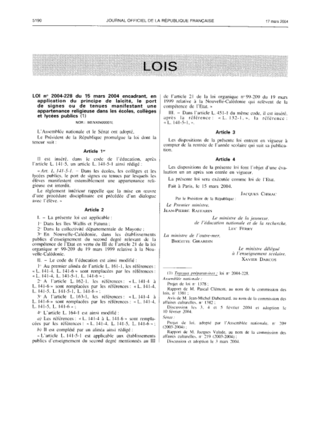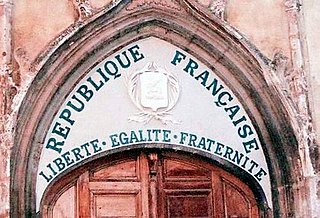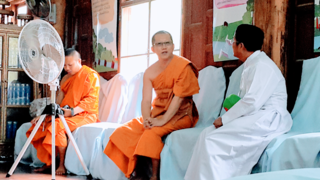Related Research Articles

A state religion is a religion or creed officially endorsed by a sovereign state. A state with an official religion, while not a secular state, is not necessarily a theocracy. State religions are official or government-sanctioned establishments of a religion, but the state does not need to be under the control of the clergy, nor is the state-sanctioned religion necessarily under the control of the state.

The French law on secularity and conspicuous religious symbols in schools bans wearing conspicuous religious symbols in French public primary and secondary schools. The law is an amendment to the French Code of Education that expands principles founded in existing French law, especially the constitutional requirement of laïcité: the separation of state and religious activities.

Laïcité is the constitutional principle of secularism in France. Article 1 of the French Constitution is commonly interpreted as the separation of civil society and religious society. It discourages religious involvement in government affairs, especially in the determination of state policies as well as the recognition of a state religion. It also forbids government involvement in religious affairs, and especially prohibits government influence in the determination of religion, such that it includes a right to the free exercise of religion.

The vast majority of people in Kyrgyzstan are Muslims; as of 2020, 90% of the country's population were followers of Islam. Muslims in Kyrgyzstan are generally of the Sunni branch, mostly of the Hanafi school, which entered the region during the eighth century. Most Kyrgyz Muslims practice their religion in a specific way influenced by shamanic tribal customs. There has been a revival of Islamic practices since independence in Kyrgyzstan. For the most part religious leaders deal only with issues of religion and do not reach out to communities, but rather offer services to those who come to the mosque. There are regional differences, with the southern part of the country being more religious. Kyrgyzstan remained a secular state after the fall of communism, which had only superficial influence on religious practice when Kyrgyzstan was a Soviet republic, despite the policy of state atheism. Most of the Russian population of Kyrgyzstan is Russian Orthodox. The Uzbeks, who make up 14.9 percent of the population, are generally Sunni Muslims.

A secular state is an idea pertaining to secularity, whereby a state is or purports to be officially neutral in matters of religion, supporting neither religion nor irreligion. A secular state claims to treat all its citizens equally regardless of religion, and claims to avoid preferential treatment for a citizen based on their religious beliefs, affiliation or lack of either over those with other profiles.

Sunni Islam is, by far, the most widely practiced religion in Tajikistan. Sunni Islam of the Hanafi school is the recognized religious tradition of Tajikistan since 2009. According to a 2009 U.S. State Department release, the population of Tajikistan is 98% Muslim,, with some Sufi orders.
Freedom of religion in India is a fundamental right guaranteed by Article 25-28 of the Constitution of India. Modern India came into existence in 1947 and the Indian constitution's preamble was amended in 1976, to make India a secular state. Supreme Court of India ruled that India was already a secular state from the time it adopted its constitution, what actually was done through this amendment is to state explicitly what was earlier contained implicitly under article 25 to 28. Every citizen of India has a right to practice and promote their religion peacefully. However, there have been numerous instances of religious intolerance that resulted in riots and mob violences; notably, the 1984 Sikh Massacre in the New Delhi territory, 1990 Exile of Kashmiri Pandits (Brahmins) from Kashmir (Cashmere), the 1992-93 Bombay Riots in Mumbai (Bombay), the 2008 Anti-Christian riots in Odisha (Orissa) & other anti-Christian violence in India. Some perpetrators of the 1984 Sikh Massacre in and around New Delhi, have not been brought to justice despite widespread condemnation.
Freedom of religion in Sri Lanka is a protected right under Chapter II, Article 9 of the constitution of Sri Lanka. This applies to all religions, though Buddhism is given the foremost place under the 1978 Republican Constitution. Sri Lanka is regarded by its Supreme Court as being a secular state.

Islam is the majority religion in Azerbaijan, but the country is considered to be the most secular in the Muslim world. Estimates include 97.3% and 99.2% of the population identifying as Muslim. Of these, a majority belong to the Shia branch (60%-65%), while a significant minority (35%-40%) are Sunni. Traditionally, the differences between these two branches of Islam have not been sharply defined in Azerbaijan.

The United States Commission on International Religious Freedom (USCIRF) is a U.S. federal government commission created by the International Religious Freedom Act (IRFA) of 1998. USCIRF Commissioners are appointed by the President and the leadership of both political parties in the Senate and the House of Representatives. USCIRF's principal responsibilities are to review the facts and circumstances of violations of religious freedom internationally and to make policy recommendations to the President, the Secretary of State, and the Congress.

The status of religious freedom around the world varies from country to country. States can differ based on whether or not they guarantee equal treatment under law for followers of different religions, whether they establish a state religion, the extent to which religious organizations operating within the country are policed, and the extent to which religious law is used as a basis for the country's legal code.
The Constitution of Bangladesh includes secularism as one of the four fundamental principles, despite having Islam as the state religion by 2A. Islam is referred to twice in the introduction and Part I of the constitution and the document begins with the Islamic phrase Basmala which in English is translated as “In the name of Allah, the Beneficent, the Merciful” and article (2A) declares that :"Islam is the state religion of the republic". Bangladesh is mostly governed by secular laws, set up during the times when the region was ruled by the British Crown.
Nepal is a secular state under the Constitution of Nepal 2015, where "secular" means religious, cultural freedoms, including protection of religion and culture handed down from time immemorial.
Freedom of religion in Tajikistan is provided for in Tajikistan's constitution. The country is secular by law. However, respect for religious freedom has eroded during recent years, creating some areas of concern.

Secularism in Bangladesh is known as "neutrality of religion" under Bangladeshi law. In the Constitution of Bangladesh, secularism is mentioned in the preamble as one of the fundamental principles of Bangladeshi law. Article 8 enshrines secularism as one of the fundamental principles of state policy. And yet, after the assassination of Sheikh Mujibur Rehman in 1975, Bangladesh went to military rule, and in 1979 removed the term secular from their constitution. Article 12 elaborates further on secularism and freedom of religion.
The status of religious freedom in Africa varies from country to country. States can differ based on whether or not they guarantee equal treatment under law for followers of different religions, whether they establish a state religion, the extent to which religious organizations operating within the country are policed, and the extent to which religious law is used as a basis for the country's legal code.
The status of religious freedom in Asia varies from country to country. States can differ based on whether or not they guarantee equal treatment under law for followers of different religions, whether they establish a state religion, the extent to which religious organizations operating within the country are policed, and the extent to which religious law is used as a basis for the country's legal code.
The status of religious freedom in Europe varies from country to country. States can differ based on whether or not they guarantee equal treatment under law for followers of different religions, whether they establish a state religion, the extent to which religious organizations operating within the country are policed, and the extent to which religious law is used as a basis for the country's legal code.
The status of religious freedom in North America varies from country to country. States can differ based on whether or not they guarantee equal treatment under law for followers of different religions, whether they establish a state religion, the extent to which religious organizations operating within the country are policed, and the extent to which religious law is used as a basis for the country's legal code.
Azerbaijan is a secular state by law. The Constitution states, "religious associations shall be separate from the state and shall not interfere in state affairs."
References
- 1 2 "2022 Report on International Religious Freedom: Tajikistan". US Department of State.
The constitution declares the country a secular state and that "religious associations shall be separate from the state and shall not interfere in state affairs."
- ↑ World Religion Database at the ARDA website, retrieved 2023-08-03
- ↑ Catherine Putz (17 April 2015). "Tajikistan: No Hajj, No Hijab, and Shave Your Beard". The Diplomat.
- ↑ "2022 Report on International Religious Freedom: Tajikistan". US Department of State. 2022.
- ↑ "Muslim-majority Tajikistan bans hijab as part of years-long campaign against public religiosity". The Print. 21 June 2024.